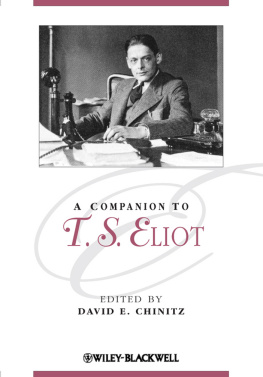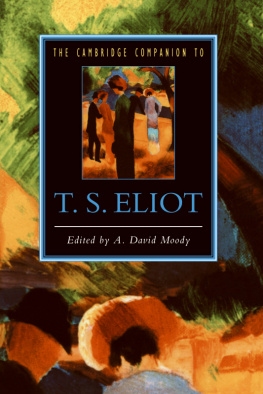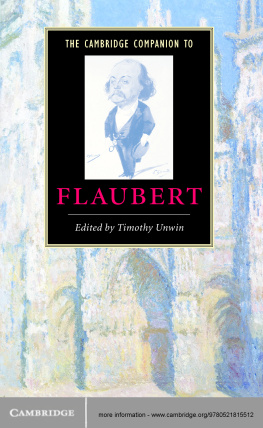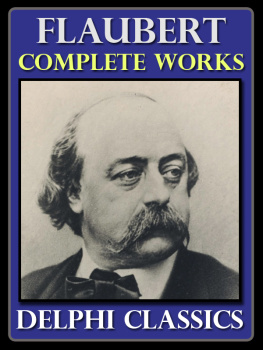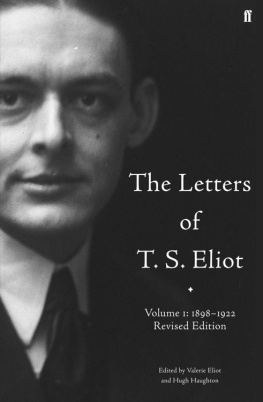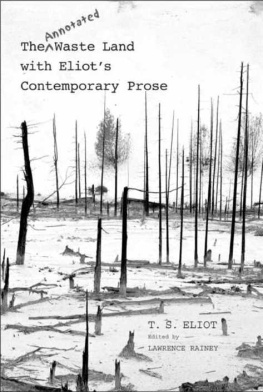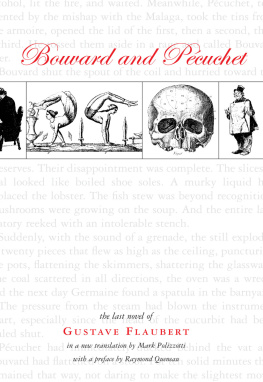ACKNOWLEDGEMENTS
This book has grown out of my doctoral research on the same topic in the Department of English and Comparative Literary Studies at the University of Warwick, where my supervisor was Christina Britzolakis. I am indebted to the department for their support and guidance during my PhD, and to the university for the funding that enabled me to sustain both the project and myself. It has been necessary, in the course of my research, to consult the larger academic community, and I am very grateful for the input and expertise of Yvan Leclerc, Nancy Davenport and Jean-Benot Guinot regarding minor points that were giving me some trouble. On a personal note, I would like to thank Harriet for her patience, and my parents for everything that they have done to enable me to reach this point. This book is dedicated to the memory of my father, and to my daughter Gretel and by its long gestation it functions as a sort of link between the two.
1 VISUAL AND VERBAL QUOTATION IN
FLAUBERT AND ELIOT
The act of setting oneself apart from the rest is not a goal. Rather, it is a necessity imposed by the disorder from which one must escape They were haunted by two biblical images: a mythical image of the lost paradise and an eschatological or apocalyptic image, that of a Jerusalem to be founded.
Michel de Certeau, The Mystic Fable
Our Hamlet of Europe is bowed under the weight of all the discoveries and varieties of knowledge, incapable of resuming the endless activity; he broods on the tedium of rehearsing the past and the folly of always trying to innovate. He staggers between two abysses for two dangers never cease threatening the world: order and disorder.
Paul Valry, The Crisis of the Mind
In coming to prepare a study on two major works from two definitively modern authors Flauberts Tentation, which anticipates so many modernist techniques and attitudes, and Eliots Waste Land, perhaps the pre-eminent poem within the modernist canon one is first struck by their intensely anachronistic nature, testifying to the fact that modernism is no byword for modernity. Such an impression is derived in no small part from the election by both authors of what Mary Orr terms the anachronistic thematic vehicle represented by the saints trial.
The ascetic already represented something of an anachronism in his original context. His longing for solitude conveyed an emphatic, even if implicit, critique of the civilization left behind, while his biography as it was both lived and written demanded that his actions conform as closely as possible to an original paradigm that ultimately extended back to Christs suffering, the authenticating norm for all actions.
Edmund Wilson discerns a kinship between Eliot and Flaubert that rests on their shared sense of the inferiority of the present to the past, elaborating that each author feels at every turn that human life is now ignoble, sordid or tame, and he is haunted by intimations that it has once been otherwise. Here Flaubert makes clear his project: an investigation of creative block as compared to a crisis of faith, the dearth of artistic inspiration analogous to the absence of Gods grace.
The Waste Land, meanwhile, positions itself as throbbing between two lives (l. 218), looking towards both a remembered past and a desired future. The nostalgic cocktail of memory and desire (l. 3) is most starkly juxtaposed in the poems opening sequence where the arid deserts heap of broken images (l. 22) gives way to a contrasting image of remembered abundance the encounter in the hyacinth garden. Like Anthonys recollection of his previously central role (On menvoyait de partout des messages. On venait me voir de trs loin),
The saint was useful to Flaubert and Eliot, then, not only for the connotation of a specific time and place distinct from their own, but also for his simultaneous affinity with a non-time and a non-place such as the desert represented. In terms of both the personal and the cultural strands of their nostalgia, it was not only a romanticized golden age that was hankered after, but also a vision of prehistory a before-time that thrust the individual, as Samuel Beckett writes in Sanies I,
back in the caul now with no trusts
no fingers no spoiled loves.
The longing of both the Tentation and The Waste Land to cast consciousness back to a pre-memorial, embryonic state demonstrates their form-making, regenerative nature. Nostalgia taken to this extreme converts a retrospective outlook into a prospective one, placing its subject in the midst of creation experiencing a symbolic rebirth that adumbrates the renewal of both personal and cultural resources. This, certainly, is the scenario at the Tentations close, implied also in The Waste Land by the drowned gods of ancient vegetation ceremonies who form Phlebass ancestry. provides not only a structure and a vocabulary for the act, but also suggests the method of composition heavily reliant on quotation that both texts employ.
Behind Flauberts and Eliots appreciation of the saint was a longing for escape that was a constant companion to their creative urge. The deeply felt desire to withdraw from worldly demands into some inner elsewhere is a prominent theme that runs throughout the oeuvre of either author from the narrator of Eliots Prufrock, for whom the stifling manners of the social world prompt a longing to retreat to the voiding depths of the ocean floor, to Flauberts Emma Bovary, whose reality falls fatally short of the inner life she has nourished with the romantic fancies of her reading. These spaces, the literary and the sub-aquatic, are as I describe in the course of this chapter associated also with the asceticism the two authors depict in The Waste Land and the Tentation.
Although escape represents a major theme in both texts, neither is in any narrow sense escapist. I do not agree with Pounds and Gourmonts sense, outlined in my Introduction, that the Tentation represents a facile disengagement on Flauberts part from his contemporary milieu. As Orr summarizes, the work expressly engages with, both philosophically and satirically, a number of contemporary trends and debates religious, scientific and aesthetic and so draws an analogy between not only the author and his saint (both actual and literary) but between the triplicate time frames that mediate them: fourth-century Egypt, medieval Christendom, and nineteenth-century France.
In the remainder of the introduction to this chapter I will provide an overview of how citation illustrates some points of contact between Flauberts Tentation, Eliots Waste Land and the tradition of hagiography that they can to a limited extent be regarded as joining. Indeed, one such area of contiguity is tradition itself. When Foucault calls the Tentation the first literary work whose exclusive domain is that of books, which serves to extend the space that existing books can occupy, Such interaction, whereby texts authenticate each other in a two-way parley that mobilizes the old text while stabilizing the new, demonstrates the partial and dependent status that the individual text cultivates through its relation to a literary tradition.
It is important for my purposes here to recognize not only the similarities between the Tentation and Eliots poem in particular their organizing principle and obscured thematic frame but also their common ancestry in original specimens of saintly literature. For many of his contemporaries, and to the especial delight of Ezra Pound who had made it his business to boom Eliot,
By taking, as Eugenio Donato describes, a pre-text that is itself textual,
The retiring of the author from the text prior to modernism is nowhere more insistent than in hagiography, where the stacking of models as Valry describes the


